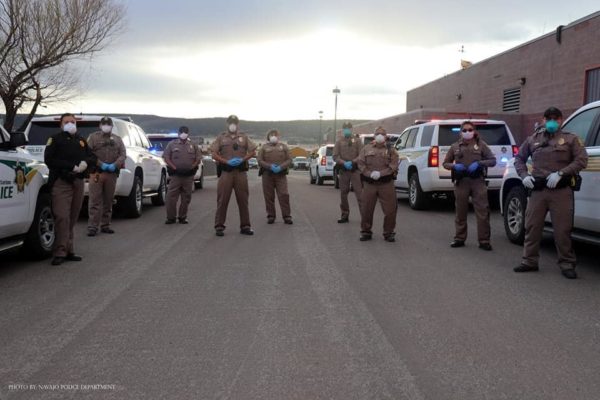
- Details
- By Native News Online Staff
WINDOW ROCK, Ariz. – On Friday, the Navajo Department of Health, in coordination with the Navajo Epidemiology Center and the Navajo Area Indian Health Service, reported 62 new COVID-19 positive cases for the Navajo Nation and six more deaths. The total number of deaths reached 330 as of Friday. Reports from 11 health care facilities on and near the Navajo Nation indicate that approximately 3,462 individuals recovered from COVID-19, with one health care facility report still pending. 47,934 people have been tested for COVID-19. The total number of COVID-19 positive cases for the Navajo Nation is 6,894.
Here are the Navajo Nation COVID-19 positive cases by Service Unit:
Chinle Service Unit: 1,796 Crownpoint Service Unit: 627 Ft. Defiance Service Unit: 414 Gallup Service Unit: 1,166 Kayenta Service Unit: 992 Shiprock Service Unit: 1,123 Tuba City Service Unit: 564 Winslow Service Unit: 204 * Eight residences with COVID-19 positive cases are not specific enough to place them accurately in a Service Unit.
"The Nation continues the 57-hour lockdown this weekend to help stop the spread of the coronavirus. It's troubling and disheartening to hear that so many positive cases have been reported in surrounding areas of the Navajo Nation. On the Navajo Nation, we have to stay the course and stay alert. We no longer have the highest number of cases per capita because we implemented proactive preventative measures, such as wearing face masks, washing our hands, and practicing social distancing. We also encourage our Navajo citizens who do not live on the Nation to do the same and stay safe. Don't back down," President Nez said on Friday.
The Navajo Police Department and county sheriff departments will establish road checkpoints throughout the Navajo Nation during this weekend's 57-hour lockdown. Curfew violators who receive a criminal nuisance citation could be fined up to $1,000 and/or up to 30 days in jail. All businesses on the Nation will be closed during the lockdown, and all Navajo tribal parks are closed to visitors until further notice.
On Friday, the Nez-Lizer team distributed food, bottled water, diapers, pet food, protective face masks, and other supplies to 644 Navajo families in the community of Tuba City in Arizona.
To Donate to the Navajo Nation
The official webpage for donations to the Navajo Nation, which has further details on how to support the Nation’s Dikos Ntsaaígíí-19 (COVID-19) efforts is: http://www.nndoh.org/donate.html.
For More Information
For more information including reports, helpful prevention tips, and more resources, please visit the Navajo Department of Health’s COVID-19 website at http://www.ndoh.navajo-nsn.
For up to date information on impact the coronavirus pandemic is having in the United States and around the world go to: https://www.worldometers.info/coronavirus/country/us/?fbclid=IwAR1vxfcHfMBnmTFm6hBICQcdbV5aRnMimeP3hVYHdlxJtFWdKF80VV8iHgE
For up-to-date information about COVID-19, Native News Online encourages you to go to Indian Health Service’s COVID-19 webpage and review CDC’s COVID-19 webpage.
More Stories Like This
Native News Weekly (August 25, 2024): D.C. BriefsNavajo Nation Mourns the Passing of Former Vice President Rex Lee Jim
Deb Haaland Earns Endorsement From Communications Workers of America Local 7076
University Soccer Standout Leads by Example
Two Native Americans Named to Democratic Congressional Campaign Committee's“Red to Blue” Program
Help us defend tribal sovereignty.
At Native News Online, our mission is rooted in telling the stories that strengthen sovereignty and uplift Indigenous voices — not just at year’s end, but every single day.
Because of your generosity last year, we were able to keep our reporters on the ground in tribal communities, at national gatherings and in the halls of Congress — covering the issues that matter most to Indian Country: sovereignty, culture, education, health and economic opportunity.
That support sustained us through a tough year in 2025. Now, as we look to the year ahead, we need your help right now to ensure warrior journalism remains strong — reporting that defends tribal sovereignty, amplifies Native truth, and holds power accountable.
 The stakes couldn't be higher. Your support keeps Native voices heard, Native stories told and Native sovereignty defended.
The stakes couldn't be higher. Your support keeps Native voices heard, Native stories told and Native sovereignty defended.
Stand with Warrior Journalism today.
Levi Rickert (Potawatomi), Editor & Publisher

